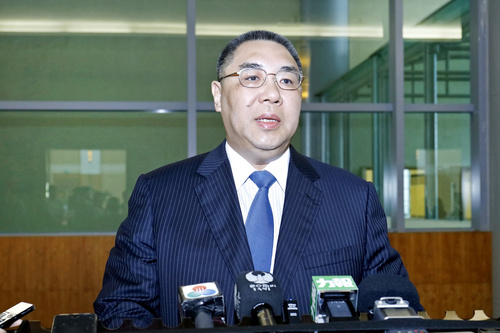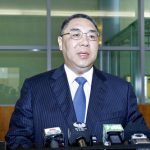 Chief Executive, Mr Chui Sai On, speaks to reporters.
Chief Executive, Mr Chui Sai On, speaks to reporters.
The Chief Executive, Mr Chui Sai On, today said Macao Foundation had fully followed and would fully comply with its existing regulations and procedures when it came to handling a planned donation to Jinan University. He said his official positions at Macao Foundation and at Jinan University had not influenced the decision regarding the donation. He added that his official positions with the institutions involved no financial or other personal interest. Mr Chui made his remarks this morning ahead of a consultation session with members of the Chief Executive Election Committee. The session was called to hear the Committee members’ opinions regarding the proposal for Macao’s Five-Year Development Plan covering the period 2016 to 2020. The Chief Executive – under the Articles of the Macao Foundation – heads the Foundation’s Board of Trustees, he said. The Chief Executive is also – by invitation – on the board of directors of Jinan University and of Huaqiao University. In both cases he has the role of vice chairperson. The two educational institutions are under supervision of the Overseas Chinese Affairs Office of the State Council. The Macao Foundation has a set of regulations to handle applications from bodies seeking subsidies: the Board of Trustees makes a collective decision regarding any such application involving more than 500,000 patacas, Mr Chui said. Neither the Chairman of the Board of Trustees – nor Mr Chui as Macao’s Chief Executive – had the power to decide funding for any particular project, he added. There are well-established systems at Macao Foundation in order to avoid – or where necessary to declare – any potential conflict of interest, he stated. The Macao Foundation decided to donate 100 million yuan to Jinan University to help support the building of new facilities in the University’s campus in Guangzhou, Guangdong Province.. Mr Chui said the Jinan University had contributed to the educational development of more than 20,000 young people from Macao over a period of years prior to Macao’s tertiary education system taking its current form. More than half of Macao medical staff – working in the private and the public healthcare sectors – were graduates of Jinan University, he added. In addition, more than 1,900 local young people are now studying at the University. Every year, an average of 300 young people from Macao enrol at the University, he added. The Chief Executive said the Government pays great attention to public opinion, noting such opinion has a role in enhancing the efficiency and quality of administrative processes. Mr Chui also commented on a protest – to be held on Sunday (15 May) – relating to the donation to Jinan University. He said the Government respects the people’s right to freedom of speech, freedom of association, and freedom of assembly. He urged anyone opting to take part in the protest to do so in a safe, lawful and rational manner. In addition, the Office of the Government Spokesperson noted that an article published by a Hong Kong media outlet involved uncorroborated and factually incorrect information about the donation to Jinan University and about the Chief Executive. The Office states the following in relation to the matter: 1. The President of the Administrative Committee of Macao Foundation, Mr Wu Zhiliang, gave full details – via a radio programme on Tuesday (10 May) – on the donation to Jinan University. 2. The Macao Foundation, as always, sets the standards for procedures regarding the handling of applications for subsidy. Jinan University submitted such an application to Macao Foundation in April. The Macao Foundation analysed the University’s application in the following terms: its social utility; the rationale behind the amount requested; the ability of the University properly to manage the subsidy; and other miscellaneous factors. 3. According to the Articles of Macao Foundation, the granting of subsidies is subject to collective decision-making: even the senior officials of Macao Foundation do not have the power individually to decide on the issue. 4. An item in a Hong Kong media outlet suggested a Government-subsidised research on Macao’s medical and healthcare system had linkage to some private business interests of the Chief Executive’s wife. Such commentary is factually incorrect. 5. The news item also suggested that several public contracts awarded for the procurement of medicine and medical facilities had linkage to some private business interests of the Chief Executive’s wife. This is factually incorrect. The Health Bureau had clarified these matters on 2 June 2009 and on 4 June 2009 respectively. 6. Mr Chui Sai Cheong, brother of the Chief Executive, did not have a business interest in projects relating to reconstruction of Tap Seac Square, as had been suggested in the media article. 7. The Education and Youth Affairs Bureau had clarified – on 12 April – the Bureau’s decision to award to a local association some work to produce teaching materials for primary education. The award of such work was within the Bureau’s power, but it required the Chief Executive’s approval because payment for the work spanned more than one financial year. The Office of the Government Spokesperson, as always, respects freedom of speech and freedom of the press and media. The Office nonetheless has a duty to correct or clarify media reports in cases where such reports have no basis in fact or are factually incorrect.


